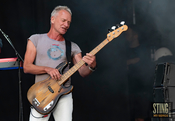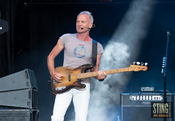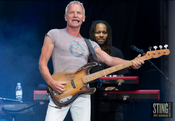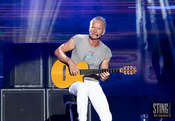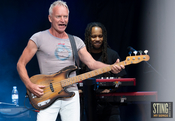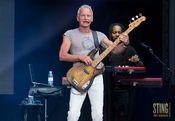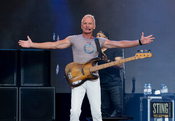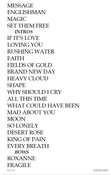
His songs, our songs...
An Englishman in Wiesbaden: Sting animates the audience at the Brita-Arena.
Sting thrills the audience at the Brita-Arena in Wiesbaden with a casually and skilfully performed collection of hits from The Police classics and his solo work.
He's old, and he needs the money? One might almost assume so, given the extensive tour schedule that Gordon Sumner, now 71, has been completing in recent months, taking him not only to multi-day residencies in Las Vegas, but also to places in Germany like Lingen and Coburg. But Sting, as everyone has called Sumner for almost half a century, will certainly no longer be concerned with the ignoble Marie, as he, like several global stars before him, has now sold the rights to his song catalogue. Although the sum for the deal signed last year with Universal Music Group was never disclosed, collections with such a wealth of hits as Sting achieved both with The Police and as a solo artist should be worth hundreds of millions of dollars.
It's therefore somewhat ironic that Sting is completing his current tour under the motto "My Songs," the title of an album released in 2019 featuring reinterpretations of some of his greatest hits, even though it should actually be called "Their Songs." The audience currently enthusiastically flocking to Sting's concerts, for example, at the very well-attended Brita Arena in Wiesbaden, won't worry about personal pronouns, however, as they will forever associate all the songs with the singer and bassist from the north of England, who stands on stage seemingly ageless, fit, and sun-drenched in white trousers and a lilac shirt, his trusty Fender bass slung over his shoulder, casually confident in his stage presence and, above all, in songs that have been faithful companions to most of the audience since their childhood or youth, and are, at best, "indestructible" and impossible to tame to death, although German radio stations in particular are trying very hard to achieve this.
"Message In A Bottle," the opening track of a concert lasting a good 110 minutes, falls into this category of the indestructible. The following "Englishman in New York" is perhaps a bit more friable, but these two pieces already demonstrate the delicate musical craftsmanship offered here on a beautiful summer evening in a football stadium that may not be quite as architecturally sophisticated. The reggae wave of "Message In A Bottle," which is at times driving in the original, is allowed to dance like the swinging "Englishman," whose original arrangement, featuring Branford Marsalis's distinctive soprano saxophone, has been significantly slimmed down.
After all, Sting doesn't have any horns in his six-piece band, preferring to rely on the skilfully played harmonica of Shane Sager, whom he slyly asks before "Brand New Day" whether he's even up to the intro, given that none other than the brilliant Stevie Wonder played it in the original. Naturally, Sager dares to play the chromatic harmonica with such virtuosity that the audience's cheers seem to be directed almost exclusively at him, a move his boss readily allows, as he also grants the other band members, whether the faithful string wizard Dominic Miller or the fantastic backing vocalists, their solo moments in the spotlight.
Thanks to the harmonies, the airily arranged songs, sometimes leaning on reggae, sometimes funk, sometimes pure pop, often have a certain soul flavour, which pleasantly surrounds Sting's still powerful, unmistakable vocals and demonstrates that even a prolific global star on a years-long best-of tour doesn't have to freeze into concert routine, but without immediately deconstructing his work.
Hits from his solo work like "If You Love Somebody Set Them Free," "Fields Of Gold," or "Shape Of My Heart" come across as bouncy, but not completely revamped; Police classics like "Every Little Thing She Does Is Magic," "Every Breath You Take," or "Walking On The Moon" are guaranteed to catch your ear from the very first note, just like they once did somewhere in the schoolyard, when six or seven little boys completely forgot about the obligatory soccer game during recess because they had to play a cassette of the song "So Lonely" over and over again on a small cassette recorder, just to hear that wild harmonica blast directly after Andy Summers' guitar solo again and again, and to be forever imbued with the wonder of music.
In Wiesbaden, this memory briefly resonates when Shane Sager plays the harmonica, but then Sting gives space to his own memory when he intersperses passages from Bob Marley's "No Woman No Cry," whose chorus he had taken over for "So Lonely." His song is someone else's song, yet it's ours.
(c) Frankfurter Allgemeine by Christian Riethmüller

